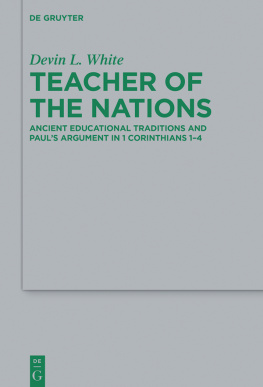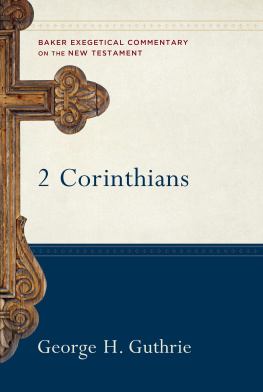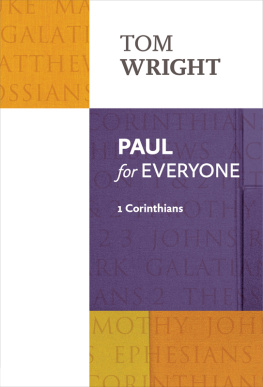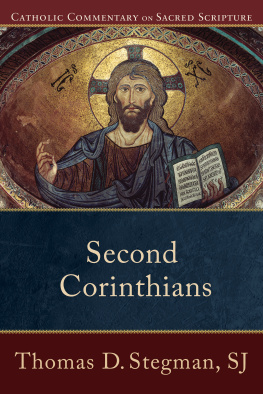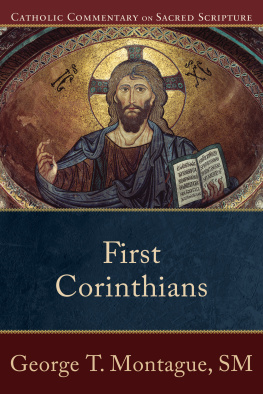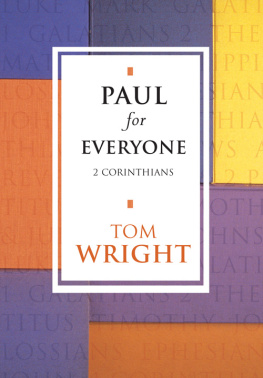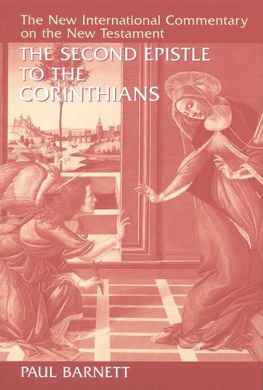Contents
Guide

Devin L. White
Teacher of the Nations
Beihefte zur Zeitschrift fr die neutestamentliche Wissenschaft

Edited by
Carl R. Holladay, Matthias Konradt,
Hermann Lichtenberger, Judith Lieu,
Jens Schrter and Gregory E. Sterling
Volume 227
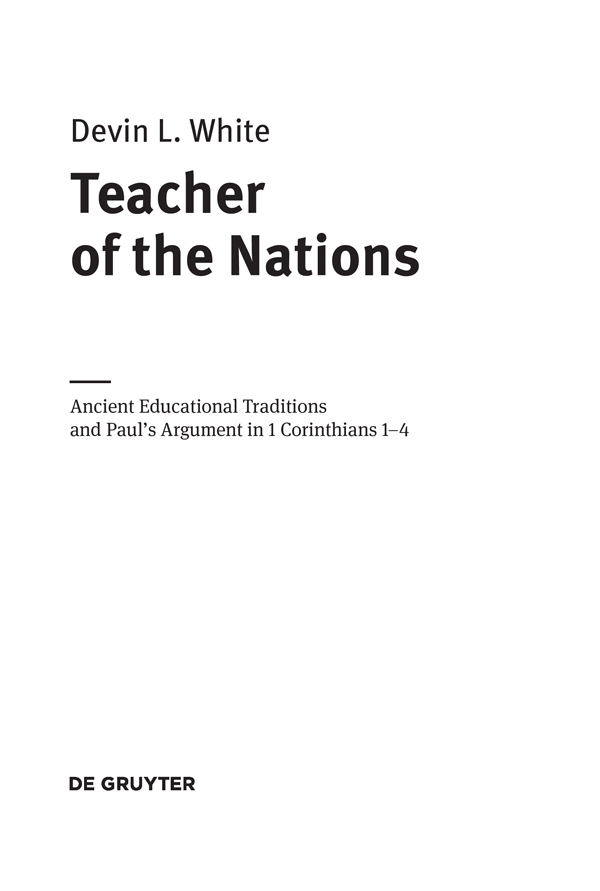
ISBN 978-3-11-053785-7
e-ISBN (PDF) 978-3-11-053955-4
e-ISBN (EPUB) 978-3-11-053817-5
ISSN 0171-6441
Library of Congress Cataloging-in-Publication Data
A CIP catalog record for this book has been applied for at the Library of Congress.
Bibliografische Information der Deutschen Nationalbibliothek
Die Deutsche Nationalbibliothek verzeichnet diese Publikation in der Deutschen
Nationalbibliografie; detaillierte bibliografische Daten sind im Internet ber
http://dnb.dnb.de abrufbar.
2017 Walter de Gruyter GmbH, Berlin/Boston
www.degruyter.com

MAGISTRO MEO PRIMO ET OPTIMO
PATRI MEO
HIC LIBER DEDICATUR
Abstract
This study suggests that ancient Greek, Roman, and Jewish educational institutions provide insight into the nature of Pauls argument in 1 Cor 14. Previous scholarship has largely interpreted 1 Cor 14 either as Pauls apology for his apostolic ministry or as Pauls critique of the Corinthians factionalism. This book attempts to clarify Pauls line of reasoning by demonstrating that 1 Cor 14 adapts features of ancient educational discourse in order to portray the Corinthian community as a school. Ancient schools provide Paul with an established script of behavioral norms from which he draws in order both to defend himself against the Corinthians criticisms (explaining that he has acted as a good teacher) and to rebuke the Corinthians for their poor behavior (depicting them as immature students).
summarizes the books contributions and suggests avenues for further scholarly inquiry.
Acknowledgements
It is a pleasure to remember the people and institutions without whom this book would have remained an unexplored idea. Its publication is a testament to their generosity, friendship, patience, support, and hard work. Since the present volume is a revision of my Emory University doctoral dissertation (2016), I begin by thanking its first readers, Anthony Briggman, Luke Timothy Johnson, and Steve Kraftchick. Their clearheaded council during the dissertations production and revision has saved me from countless errors. Special thanks are due to my dissertation advisor, Carl Holladay. In my first class with Carl in 2008, I was attracted by his high academic standards. I have learned since that Carls insistence on scholarly rigor, which he models constantly, is just one extension of his genuine interest in his students. I am honored to count myself as one of those students.
Since this book is about teaching and education, I cannot avoid mentioning several more teachers whose guidance and example led me to write it. To Lewis Ayres, Peter Anderson, J. Todd Billings, William Levitan, Carol Newsom, Charles Pazdernik, and Diane Rayor, thank you.
When I began to research and write this project, I was affiliated with two institutions: Emory University, as a doctoral candidate, and North Central University, as an adjunct professor. I am especially grateful to Tom and Merrybeth Burkman for hosting me during my time at North Central. Thanks are also due to Luther Seminary for granting me easy access to their excellent library during my time in Minneapolis.
Generous financial support and academic resources notwithstanding, Emory Universitys greatest contribution to me has come in the form of outstanding colleagues. I think particularly of Johann Choi, Chris Holmes, Matthew Pierce, and Brian Powers, whose friendship made doctoral studies a pleasure.
My family has also been a constant source of encouragement. To Bill and Jane Nagel, I offer my thanks for a comfortable place to write during vacations in Minnesota. Thanks are also due to my grandparents, Gerald and Norma White and June Richards, for their love and unfailing belief in me (and for friendly phone calls, welcome reminders of a world beyond research). In the same vein, I am grateful to my uncle and aunt, Terry and Renee White, for their generosity and prayer during my graduate studies. My siblings Hilary, Anna, and Elizabeth provided frequent occasions for laughter (usually with, but occasionally at, each other). I can never thank my wife, Jory, sufficiently for her patience, grace, and love. Without Jory, this dissertation would have taken twice as long to write at only half the quality. Finally, thank you to my parents, Brian and Leslea. If I am a teacher now, it is because you were and remain my teachers. It is to my father, Dr. Brian F. White, that this volume is gratefully dedicated.
1Introduction: Early Christian Reception of Paul and the Interpretation of 1 Cor 1
1.1Teacher of the Nations?
Roughly thirty-five years after Paul wrote 1 Corinthians, Clement of Rome sent his own letter to the still-fractious Corinthians (c. 90 CE). In this letter he reminded his audience of the example of the apostle who founded their community. Paul, he wrote, taught righteousness throughout the whole world ( ), by making himself an example () for his audience to imitate (1 Clem 5:57). Clements description of Paul as a moral exemplar appears reminiscent of the instances in Pauls corpus in which he exhorts his audience to imitate him (e.g., 1 Cor 4:16, 11:1). But a was not just any example. More specifically, it was a writing exercise common in the early stages of Greek and Roman education.
The literate members of Clements audience would have known the from painful experience. Teachers would inscribe practice sentences on wax tablets or papyri, and their students, in the midst of a years-long quest to improve their penmanship, would copy them repeatedly and meticulously. Yet Clements missive indicates another trajectory in the early Christian reception of Pauls apostolic legacy, one which valorized Paul as a teacher and associated him with the life and practice of ancient schools.
Clement was not the only second century author to correlate Paul with ancient education. According to the Acts of Paul and Thecla, Theclas contempora Other early descriptions of Paul veered away from narrative toward the encomiastic. Polycarp summarized Pauls work in glowing terms:
For neither I nor anyone like me can keep pace with the wisdom of the blessed and glorious Paul. When he was with you in the presence of the people of that time, he accurately and reliably taught the word concerning the truth ( ). And when he was absent he wrote you letters; if you study them carefully, you will be able to build yourselves up in all the faith that has been given to you.
For Polycarp, Pauls greatness lay primarily in his teaching. When he exhorts his audience to study Pauls writings, Polycarp himself sounds like an ancient schoolmaster urging his pupils to find in Homer examples of virtuous living. Polycarps Paul was nothing less than the teacher, the author, and the contents of a new Christian curriculum.

